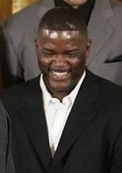A Quote by Kim Novak
So, Hitchcock wouldn't say anything about my work in the movie but, on the other hand, he wouldn't complain, either.
Related Quotes
We can talk about the value of sportsmanship on one hand, and on the other hand, the leading shots, highlights ... you see every night are the outrageous and unsportsmanlike, so I think there is a double standard here. On the one hand, we complain about it, on the other hand it's the first thing you see every night.
There are many stories of people didn't set out to make a film that became a classic - the whole process was a disaster, everybody hated each other, the movie itself was a disaster, everybody thought the movie and the script was going to be a piece of crap. Look at Alfred Hitchcock and Psycho. Nobody wanted to make Psycho; it was crap to them. The only person that wanted to make Psycho was Hitchcock. Now, it's considered a classic and a work of art.
See if you can catch yourself complaining in either speech or thought, about a situation you find yourself in, what other people do or say, your surroundings, your life situation, even the weather. To complain is always nonacceptance of what is. It invariably carries an unconscious negative charge. When you complain, you make yourself a victim. Leave the situation or accept it. All else is madness.
When you take on Hitchcock you know it's gonna provoke some sort of controversy, because there were so many people talking about the book [Stephen Rebello's Alfred Hitchcock and the Making of Psycho] and wanting it to be the film about the making of this movie [Psycho]. But that's been done. That's been done in the book, and Stephen Rebello himself was like, "I want a movie which is an entertainment for the audience." So we made the conscious decision.
The German health care system is unique in its attempt to combine competition among sickness funds on the one hand and a universal coverage plan on the other hand. Most health care systems are either one or the other, so you either have private insurance and competition but not everyone is covered for everything, or you have a single-payer system. So the ideal types are like the American system on the one hand or the Scandinavian or U.K. systems on the other end.
Germany tries to combine the advantages.
What about Gale?" "He's not a bad kisser either," I say shortly. "And it was okay with both of us? You kissing the other?" He asks. "No. It wasn't okay with either of you. But I wasn't asking your permission," I tell him. Peeta laughs again, coldly, dismissively. "Well, you're a piece of work, aren't you?
Neither the naked hand nor the understanding left to itself can effect much. It is by instruments and helps that the work is done, which are as much wanted for the understanding as for the hand. And as the instruments of the hand either give motion or guide it, so the instruments of the mind supply either suggestions for the understanding or cautions.




































